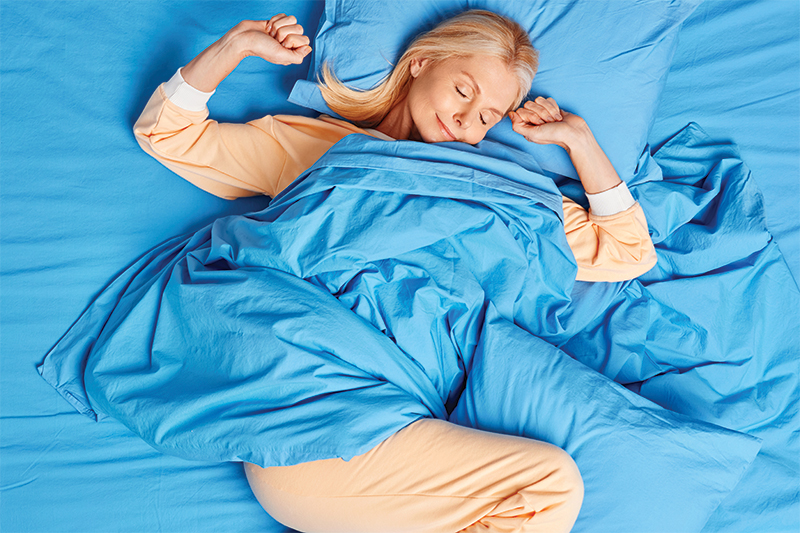As we all know, the most important involuntary act we perform every second is to breathe—after all, we need to breathe to live. But how many of us are really breathing every second? We concern ourselves with nutrition, exercise, happiness, balanced work life, family life, and so on. But do we ever really consider the importance of breathing? Millions of Americans suffer from undiagnosed sleep breathing conditions—a patient can be suffering from sleep apnea (the complete cessation of breathing) or sleep hypopnea (slow or shallow breathing). We all are aware of breathing during our waking hours. But what about while we sleep?
A Case Study in Sleep Apnea
Let me give you a real-life example. During his home sleep study test (HST), one of my patients had an AHI (apnea and hypopnea) score of 15. This means he had literally stopped breathing 15 times every hour. The duration of his sleep is seven hours and during this time, he had stopped breathing a total of 105 times and his oxygen level dropped to 74%. This is considered an emergency in hospitals and other healthcare facilities. His pulse was an astonishing 140; during sleep, our resting pulse should be right around 60. In this patient’s situation, his heart was being overworked due to the consistent cessation of breathing. Now imagine this happening every single day of his life. Sleep is the time our bodies need to relax, rest, recover, and be in the parasympathetic mode. When the body is overworking during sleep, it results in many larger problems in the long run.
Symptoms of sleep apnea are:
- snoring
- brain fog
- anxiety, depression
- stroke, high blood pressure, congestive heart failure, arrhythmia
- diabetes, obesity
- impotence, nocturia
- acid reflux
When all these symptoms are present, patients need to be tested for sleep apnea instead of just treating the symptoms. After all, the root cause should be treated in order to achieve the cure.
Sleep Apnea and Oral Appliances
You may now be wondering, “How is this connected to dentistry?” During a full mouth evaluation, dentists will note classic signs that a patient may have sleep disordered breathing, the most telling sign being teeth grinding. When the body is deprived of oxygen during sleep we grind our teeth, causing us to wake up or change positions. Some patients repeatedly break dental crowns or bridges due to continuous grinding.
Oral signs of sleep apnea are:
- narrow jaws and crowding of teeth
- tori or exostoses (extra bone on the jaw)
- erosion of teeth from acid reflux
- abfractions or chipping of enamel near the gum line
- extreme sensitivity of teeth
- forward head posture
- dry mouth
- morning fatigue and daytime tiredness
- bags under eyes
- tongue tied, tongue too large for the mouth, resting on teeth such that the back of the throat can’t be seen, scalloping of tongue on the sides
- lips apart at rest (mouth breathing without realizing it)
When I started noticing these signs, I realized that I wanted to offer oral health services as a gateway to whole body health. I do not want to be just a tooth mechanic; I want to create awareness and educate patients so they can be the advocate for their overall health.
How Your Dentist Can Help You Get a Better Night’s Sleep
Many patients dislike using CPAP machines or having to leave their homes for a sleep study. At Dr. Jay Dental we have HST, where patient can take the equipment to their home for the night and return to us the next day, so we can then send the raw data to a board-certified sleep physician. If patients have sleep apnea, we have different treatment options like oral appliances and laser therapy, which opens the airway and helps the patient breathe better. Our noninvasive laser therapy (also known as Nightlase) is done with our Fotona laser, stimulating collagen production in the soft palate and oral tissues that in turn opens the airway. We also offer laser tongue-tie revisions and myofunctional therapy, which helps the tongue to be in a better position for proper airway opening.
Sleep apnea is a progressive disease for which excessive snoring is a key sign, a loud message to check for a clogged airway. Habitual excessive snoring leads to stroke, Alzheimer’s, and cardiovascular diseases. Simply recommending a night guard does not stop teeth grinding in patients—the airway needs to be opened for the patient to breath better and stop grinding. As always, the root cause needs to be treated in order to achieve the proper cure.
Dr. Krithika Jayaprakash, DDS, FAGD, IBDM. Naturopathic dentist specializing in ceramic implants and all your dental needs.
Dr. Jay Dental, 170 Union St., Vernon, CT, 06066. 860.875.3349.
drjaydental.com.
